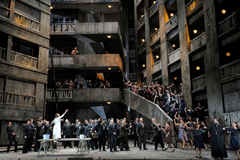| Opera Reviews | 16 April 2024 |
A star is born, as Evgenia Muraveva steps in as Katerinaby Moore Parker |
|
| Shostakovich: Lady Macbeth of Mtsensk Salzburg Festival 10 August 2017 |
|
|
The engaging up-and-coming Russian soprano already has the role under her belt (for the Mariinsky Theatre) and - as the Salzburg-scheduled Aksinya and the Woman Convict - was familiar with this new Austrian production. In fact, Miss Muraveva’s only hint of nervousness appeared to be after her solo bow when she hesitated to beckon the conductor, Mariss Jansons to the stage. This Katerina Ismailova was a natural - weaving her way through the character in her contempt for her sapless husband, and showing unyielding resilience to her hectoring father-in-law, while subsequently bound by unrelenting passion and devotion to Sergei. In closing, Katerina’s unwavering stare into oblivion in bitter resolve to die while taking her rival with her was quite chilling and tragic - actually winning sympathy for a character who may not be to everyone’s taste. Vocally, ample resources were available to stay the course - indeed, with a surprisingly rich lower register balancing an imposing and well-projected top. A soprano whose star is undoubtedly in the ascendant. Katerina’s lover, Sergei is at least as challenging a task with its grueling tessitura and strenuous physical demands. Brandon Jovanovich impressed in every respect, vocally soaring across the vast orchestra pit and the conductor’s bold baton, and ideally captivating the caddish charm and virility demanded by the role. Giving his festival debut as Boris, Dmitry Ulyanov cut a nasty vainly-sadistic tyrant, constantly stroking back his hair and toting a wooden switch to underscore his authority. While vocally absolutely adequate, a notch more weight and snarl to the timbre would, nevertheless, not have gone amiss. Maxim Paster’s (also debuting at Salzburg) alcoholic and seriously overweight Zinoviy was ideally unappealing, cowering in his father’s presence (even in his vocal utterances) to enjoy only a brief burst of vigour when challenging Katerina before his demise. Both Stanislav Trofimov’s Priest and Alexey Shishlyaev’s Police Chief were characterful, but - like some of the smaller roles in the production - also bordered on caricature at times, which naturally detracted somewhat. Sergei’s double-take to the audience when about to hide in Katerina’s overfilled closet in Act 2, scene 5 was another example. In general, however, the supports were strongly cast with a memorable cameo from Andrei Popov as the corpse-finding drunkard, and Ksenia Dudnikova’s fruity-toned Sonyetka. Andreas Kriegenburg’s production is truly vast - yet detailed - in scale. The 20th century setting includes a computer screen on Zinoviy’s desk - though, evidently not yet the latest model by Apple. A decrepitly-depressing housing complex dominates the entire stage while allowing apertures for sliding sub-spaces which serve impressively as Katerina’s bedroom, Zinoviy’s office, the Police quarters, and the Women’s jail in Act 4 (sets by Harald B. Thor). A central area functions for the copious ensemble scenes, which were all expertly managed and appropriately raucous. However, Acts 3 and 4 floundered somewhat with rather limp timing and logic in the wedding/arrest scene, no substantial change in set or atmosphere to depict the march to Siberia, and with the two life-sized effigies of Katerina and Sonyetka thrown over one of the apartment balconies as they drown in the lake adding a further blemish to a production that is otherwise stupendous. Clever lighting by Stefan Bolliger included periodic coloured projections (sometimes intentionally unsteady and phased), and served as a vital asset in breaking the potential monotony of a one-set/four-acter. Some superb singing emanated from the Konzertvereinigung Wiener Staatsopernchor, to compliment the Vienna Philharmonic Orchestra - also in pristine form - under the baton of Mariss Jansons, in his first Austrian opera production. Fastidiously-detailed and accurate while at times bombastic and primal in approach, it is hard to consider a more apt reading of the score - furthermore, one to match the scale of this exceptional setting and concept.
|
|
| Text ©
Moore Parker Photo © Salzburger Festspiele / Thomas Aurin |

 An event such as this sparks memories of the musical 42nd Street, or the Bette Davis classic, All About Eve - with a young and attractive standby waiting in the wings for the star of the show to sprain her ankle or catch a cold. Nina Stemme’s specific indisposition on this evening was not made public, but it soon became apparent that initial disappointment regarding her cancellation would be displaced by respect (and more), with the Festspielhaus’ preened patrons stamping their feet like football fans for her replacement, Evgenia Muraveva, at the final curtain.
An event such as this sparks memories of the musical 42nd Street, or the Bette Davis classic, All About Eve - with a young and attractive standby waiting in the wings for the star of the show to sprain her ankle or catch a cold. Nina Stemme’s specific indisposition on this evening was not made public, but it soon became apparent that initial disappointment regarding her cancellation would be displaced by respect (and more), with the Festspielhaus’ preened patrons stamping their feet like football fans for her replacement, Evgenia Muraveva, at the final curtain.





